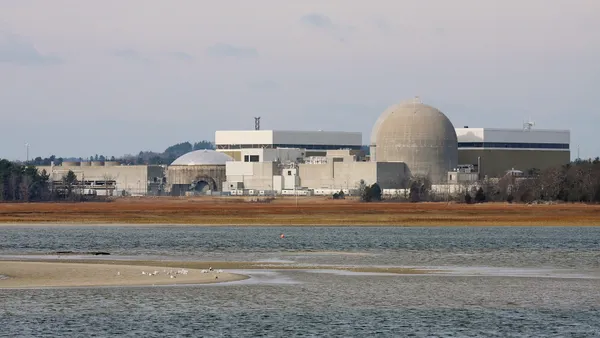Dive Brief:
- The Atlantic Coast Pipeline faces setbacks in North Carolina after the state's Division of Energy, Mineral and Land Resources rejected the erosion and sediment control plan for the northern portion of the pipeline's route across the state. Developers can make changes and refile the application.
- The Division of Air Quality in December also requested additional information from the pipeline developer, and is now reviewing an air quality modeling report provided by ACP.
- Federal regulators approved the Atlantic Coast project in a 2-1 vote in October 2017. ACP will run 600 miles, stretching from West Virginia into North Carolina and includes three planned compressor stations.
Dive Insight:
The Atlantic Coast Pipeline, being developed by Dominion Energy, is one of a pair of controversial Southeast pipelines that are facing additional scrutiny and pushback at the state and county level despite approval from the Federal Energy Regulatory Commission last year.
Along with Atlantic Coast, FERC also approved the Mountain Valley Pipeline in 2017, which would stretch 300 miles through Virginia and West Virginia. The two pipelines have faced substantial opposition; in Virginia, lawmakers are considering new rules for pipeline developers.
Several bills proposed by Democratic lawmakers in Virginia would place more scrutiny on both the projects, and could include requiring water quality performance bonds and additional permits, according to the Richmond Times-Dispatch.
The Division of Energy, Mineral and Land Resources rejected Atlantic Coast's erosion and sediment control plan on more than 14 points, but said the company could submit a revised plan addressing the issues. The state would have 15 days from approve or disprove the revised plan. Conversely, ACP could contest the rejection and will need to request an administrative hearing within 60 days.
Earlier this month, Sen. Tim Kaine (D-VA) asked FERC to grant rehearing of the two pipeline certificates it approved last year, noting that when the agency made the decision it had just three regulators rather than a full complement of five.
The Virginia Senator's call for FERC to reconsider its approvals comes as the U.S. Army Corps of Engineers and National Park Service have granted permits and right-of-ways that will allow the Mountain Valley line to move forward.














